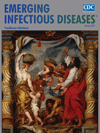Enteric Diseases Epidemiology Branch
Medscape Commentaries
 January 24, 2011: Foodborne Illness: A Handy Overview
January 24, 2011: Foodborne Illness: A Handy Overview
CDC expert Dr. Barbara Mahon discusses the serious and widespread nature of foodborne illness.
 September 6, 2011: Hold the Raw Sprouts, Please
September 6, 2011: Hold the Raw Sprouts, Please
CDC Expert Dr. Rajal Mody discusses the health risks of eating raw sprouts.
 February 27, 2012: Spotlight on Invasive Listeriosis After the 2011 Outbreak
February 27, 2012: Spotlight on Invasive Listeriosis After the 2011 Outbreak
CDC expert Dr. Benjamin Silk presents key information on listeriosis in the aftermath of the large 2011 outbreak.
CDC's lead epidemiology and surveillance group for tracking pathogens and identifying sources for bacterial enteric (intestinal) infections transmitted by food and other routes.
Activities
- Monitoring human illness
- Defining the burden of foodborne illness, especially those due to bacteria
- Attributing illness to transmission routes and to specific foods and settings
- Targeting prevention measures to meet food safety goals
- Providing data and analyses that inform food safety action and policy
Enteric infections enter the body through the mouth and intestinal tract and are usually spread through contaminated food and water or by contact with vomit or feces. Every year, millions of cases of foodborne illness and thousands of associated deaths occur in the United States. Much of this burden could be prevented with better science and prevention tools. Each year in the developing world, diarrheal illness from contaminated food and water causes 2 million deaths in young children. We are working to meet national goals to decrease the burden of bacterial and diarrheal illness by the year 2020.
We accomplish our work through innovative public health investigative and consultative groups that identify causes, sources, and solutions for bacterial foodborne and diarrheal infections to prevent the disability and death those diseases cause. Our central values are scientific integrity, rapid response to emergencies, service to states and nations, innovation through informed expertise, and close collaboration between disciplines of epidemiology and microbiology. We are organized in teams covering antimicrobial resistance,outbreak surveillance and analytics, national surveillance, and FoodNet and diarrheal diseases.
Enteric Diseases Highlights
Contact Us:
- Centers for Disease Control and Prevention
1600 Clifton Rd
Atlanta, GA 30333 - 800-CDC-INFO
(800-232-4636)
TTY: (888) 232-6348
24 Hours/Every Day - cdcinfo@cdc.gov



